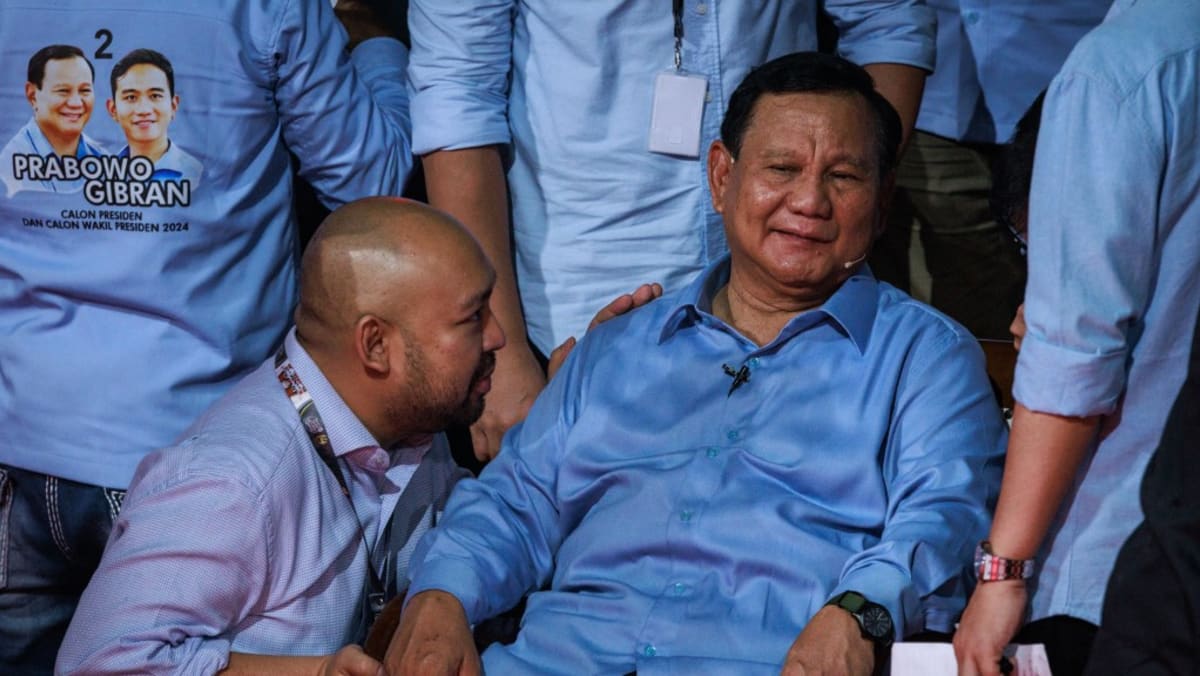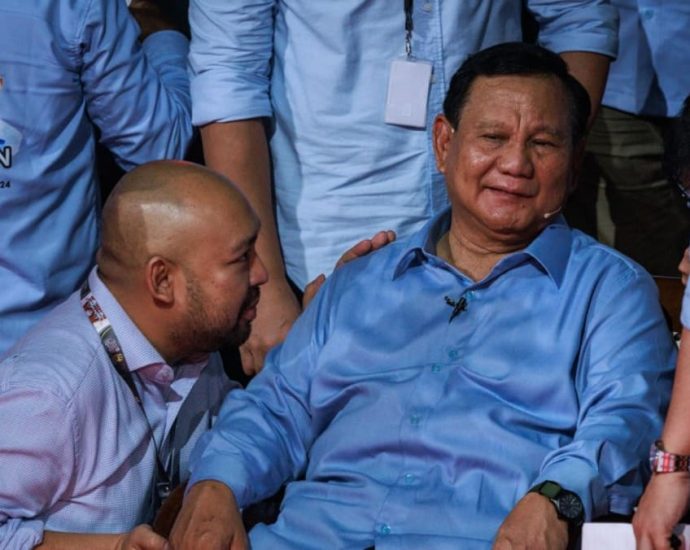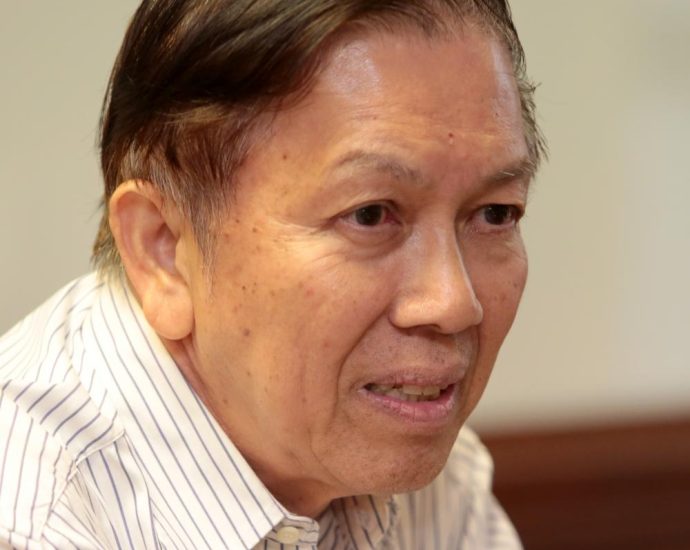Ex-police officers, tech experts: Singapore banks ramp up hiring to fight scams

RECRUITING EX-POLICE OFFICERS
Between December 2021 and January 2022, nearly 800 people were duped in an SMS phishing scam involving OCBC. More than S$13 million was lost.
The bank ended up covering the full amount as “goodwill payouts”.
Several months after the incident, OCBC consolidated its anti-scam and fraud functions under one department then tripled its headcount for the team to more than 100.
The move was in anticipation of an increase in the number and complexity of scams, said Mr Beaver Chua, the bank’s head of anti-fraud.
Two-thirds of the team are involved in 24-hour surveillance work, while others are stationed at the police’s anti-scam command centre or involved in advisory and analysis.
Singapore banks also recruit former law enforcement officers for their anti-scam teams. Also in demand are those with experience in fraud risk management and advisory, as well as system analysts and fraud analytics experts.
This varied nature of talent needed reflected how scams were becoming more sophisticated and technologically driven, banks said.
“It is quite challenging,” said OCBC’s Mr Chua. “In the past, the team would normally just have ex-police officers but now we need people with diverse backgrounds and different kinds of expertise.”
One such hire was Beverly Teo, formerly with the Commercial Affairs Department (CAD), the police’s white-collar crime investigation agency.
As an anti-fraud specialist with OCBC, Ms Teo advises on controls that can help prevent scams, such as the slew of security updates targeted at malware scams. She also works on various scam-related training and awareness programmes for both bank staff and customers.
Ms Teo said her experience at the CAD’s Suspicious Transaction Reporting Office and the Public Institutional Fraud Division has come in handy.
“All those would have taught me things like understanding commercial transactions, how to investigate individuals and businesses by reading their ledgers,” she said.
“The bank has a lot of data, so my experience helps me to analyse and understand it, and identify any abnormalities in the financial transactions.”
Commentary: Indonesia presidential frontrunner Prabowo falters in debate but could win election

Anies kicked off his opening statement with an attack on Prabowo’s track record in Cabinet.
Anies, the former Jakarta governor, chided Prabowo that the defence ministry has a large budget but couldn’t protect its website from a 2023 hack. In a bid to up the ante, and apparently referring to Mirage jet fighters from Qatar, Anies said the ministry that Prabowo leads plans to buy used primary weaponry hardware but half its troops don’t have housing.
According to the 2024 state budget, the defence sector is allocated 139.1 trillion rupiah (US$9.27 billion) or 5.6 per cent of total central government expenditure.
Ganjar piled in, also questioning the purchase of used jet fighters, which would require three years training for air force personnel as part of the technology transfer.
Appearing ruffled, Prabowo explained that military aircraft and warships have a 25 to 30 year life span. The plan to buy Mirage fighters from Qatar, he said, was no problem as they could still fly another 15 years, and buying new planes requires a longer delivery period of up to seven years.
Ganjar then sought to turn the debate to defence strategy, declaring he would prioritise naval capacity.
“No attack will come overland as Indonesia is an archipelago. Thus, the sea must be fortified,” Ganjar replied to a question from Prabowo on what defence area he would prioritise and how the budget would be increased to satisfy that need.
He said the Indonesian Navy has told him it needs sensor technology and sonars to guard the country from seaborne attack. Ganjar pledged to increase the defence budget up to 2 per cent of Indonesia’s gross domestic product – up from 0.78 per cent presently. This can be achieved by boosting economic growth from the present 5 per cent to 7 per cent, Ganjar said, allowing domestic defence industries to build tanks, helicopters and submarines, and enhance cyber technology.
Commentary: Is Chinaâs era of miracle growth over?

Second, local governments enjoy soft budget constraints. They have easy access to extrabudgetary financial resources, which are essential for them to fund investment projects and accommodate investment hunger.
Although the central government has strengthened its control over local government debts in recent years, soft budget constraints continue since ensuring economic growth remains to be one of the key performance indicators for local governments.
Third, China has a simulated financial market – key financial activities are orchestrated by the government. China’s central and local governments not only own and control most financial institutions, but they also possess the power of appointment and removal of executives.
The simulated financial market is essential to reinforce soft budget constraints and political objectives, so dominant players are not motivated by profit. Credit risks and counterparty risks are difficult to assess because they are strongly influenced by government decisions.
When risks cannot be appropriately assessed, it is difficult for financial products to be reasonably priced.
Furthermore, the heavy control of the government also means that the private sector has very limited access to formal financial resources and must rely mainly on informal channels which increase borrowing costs and uncertainties.
In the 1980s and 1990s, China was able to remove key institutional barriers to establish the goods and services market and the labour market, thereby releasing pent up energy to allow for rapid economic growth over the last 40 years.
China’s economy has also successfully integrated with the global economy under favourable international conditions, especially after its World Trade Organization accession in 2001.
However, China’s economy still has strong Hungarian characteristics, and there is no significant progress in developing the financial market, which is the most essential mechanism in allocating resources productively.
A new party but with old values
The Democrat Party faces an uphill battle to bring back the good times as its popularity is plummeting in the wake of internal conflicts that have left it in disarray.
When in opposition, the Democrats have long been known for their ability to keep the government in check. This was the case again when they scrutinised the government’s 2024 budget bill during a recent parliamentary debate from Jan 3-5.
However, in recent years, the party has been dealt some harsh blows, ranging from party veterans defecting to other parties, to internal conflicts during Jurin Laksanawisit’s tenure as party leader.
According to observers, the party now faces a crisis of faith and its new leader Chalermchai Sri-on must rise to the challenge of reversing the situation and restoring party unity.
Mr Chalermchai, while party secretary-general, vowed to quit politics if the Democrats won fewer than 52 seats in last year’s election.
Despite witnessing the party’s disappointing poll performance, Mr Chalermchai not only failed to do so, but stood for the party leadership.
He was elected overwhelmingly and uncontested at the party assembly on Dec 9, in which the poll was reportedly engineered to favour him.
The leadership contest led many analysts to believe this could spell the end for the country’s oldest political party.
Mr Chalermchai dismissed a rumour the Democrats under his leadership may switch sides from the opposition and join the coalition government led by Pheu Thai.
He said the party is committed to being an opposition party and their scrutiny of the 2024 budget bill reflected the solidarity and unity among members. “The party will not serve as a spare part [for the Pheu Thai-led government] as alleged,” he said.
Stithorn Thananithichot, director of the Office of Innovation for Democracy at King Prajadhipok’s Institute, told the Bangkok Post this remark should be taken with a grain of salt.
“His words should only be believed after the Democrats have remained in the opposition camp until the end of this government’s four-year term,” Mr Stithorn said.
The departure of several long-serving party members is fuelling speculation that a new party may be on the horizon.
Among the high-profile figures to quit the party were former prime minister Abhisit Vejjajiva, former deputy public health minister Sathit Pitutecha, and former PM’s Office minister Sathit Wongnongtoey.
Some of these individuals and current members have discussed the possibility of establishing a new party with a conservative, pro-monarchy stance that will not only embrace changes, but also uphold the rule of law and justice, a source said.
This new party would be a collaboration between seasoned politicians who will devise strategies and play a supportive and advisory role behind the scenes and a group of energetic young leaders who will take a prominent role and actively represent the party.
Conservatism alive and well

Surachart: ‘Don’t worry about the MFP’
Surachart Bamrungsuk, a political scientist at Chulalongkorn University, told the Bangkok Post that he welcomed the idea of setting up a party that espouses conservatism. “Conservative parties will never fade away,” he said.
If those former Democrats form a new conservative party as reported, it must also rival the United Thai Nation (UTN) Party, which also adopts conservative ideologies, Mr Surachart said.
Even though former prime minister Prayut Chan-o-cha is no longer a UTN member, its secretary-general, Akanat Promphan, still has what it takes to steer the UTN forward, Mr Surachart said.
“A new party should not worry about the Move Forward Party, which is popular among young voters, as they cater to different target groups,” he said.
“I want to see a conservative party become a mainstream party. Such a party should not bow to the military. The new party should focus mainly on tackling the unrest in the deep South,” he added.
“It also must adhere to its ideologies. It will never be independent if it is subservient to financiers,” he said.
Meanwhile, Mr Surachart said veteran politicians who remain with the Democrat Party such as Chuan Leekpai and Banyat Bantadtan should also support and guide young party members through tough times.
He also noted that Watanya Bunnag, chairwoman of the party’s political innovation committee, is the party’s rising star, though she needs to be groomed further by seasoned party figures.
Ms Watanya, 39, wanted to enter the party leadership contest, but was unable to do so because she failed to win enough support to waive a regulation requiring a candidate to have been with the party for five years.

Stithorn: Doubts over Democrat commitment
She defected from the Palang Pracharath Party last year.
Mr Stithorn also believes there is still room for conservative parties to thrive in the country, adding that while the UTN is the only party that makes clear its conservative stance, the Democrats seem to shy away from it out of fear it will lose young voters if it draws closer.
“Since Gen Prayut is no longer involved in politics, the Neo-Democrats must be fully committed to their conservative stance, rather than making just a half-hearted attempt,” he said, referring to former Democrats wanting to set up a new party.
“If it can do so, it will win the backing of those who do not support the MFP and Pheu Thai, because in the next election, the UTN may no longer exist,” Mr Stithorn said.
While there are still people who prefer a party with a conservative stance, such a party will not grow into a big one, but it could grow into a medium-sized party.
“There will be enough time for alternative parties to emerge before the next election,” Mr Stithorn said.

Phichai: New party must rival UTN
Phichai Ratnatilaka Na Bhuket, a political scientist from the National Institute of Development Administration, told the Bangkok Post that any new conservative party must have a clear policy stance as it must rival the UTN for voter support.
“While a conservative party will never fade away, it is hard for such a party to grow. People who prefer a conservative party want a leader with strong leadership skills and moral integrity, but such leaders are difficult to come by,” Mr Phichai said.
“The glory days of the current Democrat Party are now at an end, though a new-generation member like Ms Watanya has emerged as a beacon of hope,” Mr Phichai said.

Olarn: Parties fear losing young voters
Olarn Thinbangtieo, a political science lecturer at Burapha University, said many Thais still support a “modern” conservative party that is willing to adapt to change.
“Several parties shy from adopting conservativism because they fear they will lose support from young voters.
“But we must admit that conservative parties still have a following; they only need to adjust to changing circumstances,” Mr Olarn said.
Thaksin ‘eligible for parole’

PUBLISHED : 18 Jan 2024 at 04:00
Convicted former prime minister Thaksin Shinawatra is eligible for parole and it will be left to the Bangkok Remand Prison to submit a request to this end to the Department of Corrections (DoC), a department official said.
Sitthi Sutivong, the DoC’s deputy director-general and spokesman, made the remarks at a press briefing held at the Justice Ministry to explain the issues related to Thaksin’s medical treatment outside prison.
He said Thaksin meets the criteria for parole as he is classified as a medium-grade prisoner who is over 70 years old and suffering from various illnesses.
However, the regulation requires that the prison director seek parole for inmates who do not have the right to do so themselves, Mr Sitthi said. Normally, this is done on a monthly basis.
Mr Sitthi said the director of Bangkok Remand Prison, where Thaksin was admitted on Aug 22 last year, had not requested parole for Thaksin yet.
There was no word on when he might do so.
”If Thaksin was released on parole, the DoC’s parole committee would consider whether Thaksin would be subject to electronic monitoring,” he said.
Mr Sitthi said one regulation also requires that if granted parole, the inmate would need ”a sponsor” who the inmate would live with.
The Department of Probation is responsible for verifying who is suited to become the sponsor of an inmate, Mr Sitthi said, adding that an inmate on parole must report to probation officials regularly and must stay within a specific area determined by the parole supervisor.
Somboon Muangklum, adviser to the justice minister, told a press conference that many parties were trying to verify whether Thaksin is really ill and if he is in a ward at the hospital.
He said a representative of the Ombudsman had visited the Police General Hospital and met Thaksin on the 14th floor of the hospital’s building.
Mr Somboon said he also believed Thaksin is still at the hospital and was not staying elsewhere as some people suspect.
Thaksin, 74, was admitted to Police General Hospital on his return to Thailand on Aug 22, and has been allowed by the DoC to stay on despite reaching the maximum number of 120 days allowed for inpatient care on Dec 22.
The DoC said last Thursday that it moved Thaksin to the hospital on Aug 23 because he needed ongoing treatment and observation for many illnesses that required close monitoring.
Upon Thaksin’s return from 15 years of self-imposed exile, the Supreme Court sentenced him to eight years in jail for three cases, but the sentence was commuted to just one year after he received a royal pardon.
House panel questions Isoc prosecuting 9 youths

PUBLISHED : 18 Jan 2024 at 04:00
A House committee studying the promotion of peace in the deep South has voiced concerns over the Internal Security Operation Command (Isoc) Region 4’s decision to pursue legal action against nine young activists who participated in a peaceful event last year.
Chaturon Chaisang, head of the special panel, said legal action against the activists engaged in peaceful activities is not conducive to efforts to bring peace to the deep South and could hinder the process or even be used to instigate unrest or violence.
Mr Chaturon, a list-MP from the ruling Pheu Thai Party, said protecting freedom of expression and creating space for people to exchange their views are more favourable and should be encouraged.
The veteran politician was speaking after accepting a petition from one of the activists who attended the Civil Society Assembly for Peace (CAP) event at Wasukree Beach in Pattani’s Sai Buri district on May 4, 2022, and who now face charges of causing incitation and criminal association.
The activists claimed they face legal action because they wore a traditional Malay outfit, but the Fourth Army Region chief, Lt Gen Santi Sakuntanak, denied such a claim.
According to security officials, those who faced court summons were involved in activities aimed at promoting separatism and were displaying the symbol of the Barisan Revolusi Nasional Melayu-Patani (BRN) separatist movement.
Mr Chaturon said the committee would look into the case and make recommendations to the House of Representatives.
“We’d like to urge authorities to be careful in handling cases. They must have solid evidence and ensure charges fit the alleged offences, or such moves can hinder the peace process,” he said.
Fair Party list-MP Kannavee Suebsang raised the issue yesterday during the House meeting and called on Prime Minister Srettha Thavisin to ensure that laws are not abused to silence people.
Mr Kannavee said several human rights activists and humanitarian workers face charges and such treatment was a slap in the face for the House. Deputy House speaker Padipat Santipada yesterday wore a traditional Malay outfit to the House meeting.
Ministry to use AI to diagnose depression

PUBLISHED : 18 Jan 2024 at 04:00
The Public Health Ministry will apply artificial intelligence (AI) to its online platform to help with diagnosing depression in patients, Dr Opas Karnkawinpong, the permanent secretary for public health, said yesterday.
The AI system, known as the Detection and Monitoring Intelligence Network for Depression (DMIND), was developed in collaboration with the Department of Mental Health (DMH) and the Faculty of Engineering at Chulalongkorn University.
Dr Opas said the AI system was developed to help psychiatrists and therapists with basic screening for depression. The system was designed to be accessible and easy to use, but effective. DMIND is linked with Mor Phrom’s account on Line Messenger. Users can talk with a therapist using the account’s chatbot function or ask personalised questions for depression screening using the Mental Health Checkup function.
The system also includes voice and facial expression detectors, which helps with categorising users into four colour codes. After using the function, users who are assigned a yellow code are expected to receive a callback from a therapist within seven days; those in the red code category will receive a callback within a day.
Dr Pongkasem Kaimuk, DMH director, added the application was developed to respond to users’ demand for more AI therapists to help with basic therapy. More functions, such as user journey tracking and assistance for those with critical depression symptoms, are expected to be added in the future, added Dr Pongkasem.
According to DMH, at least 2.4 million patients received mental health therapy in 2022, compared to the 1.3 million reported in 2015. The suicide rate also rose from 7.26 per 100,000 people to 7.94 per 100,000 people, with the majority of people committing suicide being of working age (20–59 years old).
The report relates to information provided by the Centre of Excellence in Digital and AI for Mental Health (AIMET), which estimates that at least 2,200 of 100,000 teenagers over 15 years old have depression.
Klity Creek lead levels are ‘on the decline’

PUBLISHED : 18 Jan 2024 at 04:00
The level of lead contamination in Kanchanaburi Province’s Klity Creek has fallen and the affected sediment is still being cleaned up, according to the Department of Pollution Control.
The contamination level is now at 3,000 milligrammes per kilogramme, compared to more than 100,000 ug/kg in the pre-rehabilitation phase.
Klity Creek is closely monitored every four months, said the director of the department’s domestic wastewater management division, Chayawee Wangcharoenrung.
With a budget of more than 600 million baht, two phases of clearing the lead-contaminated sediment have been launched under the Supreme Administration Court’s order in 2013, he said.
More than 100,000 tonnes of sediment have been removed, he noted.
“The next step is to review the level of lead contamination in the environment and in local people’s blood to decide if we should come up with other plans,” Mr Chayawee added.
He said that even though the rehabilitation work is ongoing, the department lacks the funds to make frequent site visits due to the delay in disbursing the fiscal budget.
That being said, the initial results of a project evaluation conducted by the Thai Environmental Engineers Association has proved satisfactory, he said.
However, not everyone is happy with the progress and wants the department to do more.
Surapong Kongchanthuek, director of the Centre for Study and Development of Karen, said the clean-up process officially expired in 2022 and has not yielded a satisfying result.
The sediment was not properly cleared away but instead removed to a secure landfill above the creek, leaving local people with concerns about future leaks, he said.
Meanwhile, the level of lead contamination noted in local water sources and wildlife remains about the suggested safety standard, he added
In response, Mr Chayawee said: “The department has a clear mission to clean up the creek and provide a safe environment for local people.
“But that doesn’t mean we will remove all of the lead from the environment.
“If the lead is still under the soil and not exposed to the general environment, it is still safe for people to go about their daily business.”
Rajavithi achieves 1st for state hospital

PUBLISHED : 18 Jan 2024 at 04:00
Rajavithi Hospital has become the first state-run hospital to successfully perform a simultaneous liver-kidney transplant on a patient, the Department of Medical Services (DMS) says.
The 54-year-old female patient, who registered for the transplant waiting list in September 2023, underwent a 12-hour kidney and liver transplant on Jan 5.
The newly transplanted organs are functioning normally, said Dr Vorapot Choonhaklai, chairman of Rajavithi Hospital’s Excellence Centre for organ transplantation.
The success was attributed to the strong cooperation between various departments and agencies including gastrointestinal surgeons and nephrology doctors, Rajavithi Hospital’s organ donation centre and the National Blood Centre of Thai Red Cross Society. But most significant of all were the people who donated their organs, said Dr Vorapot.
Organ transplantation is the last resort to save the lives of patients who suffer organ failure, particularly heart, lung and liver failure, said DMS deputy director-general Dr Nattapong Wongwiwat.
And for patients in the final stage of a chronic kidney disease, a transplant would allow them to regain a normal level of well-being and with lower chances of developing an intercurrent illness, which can be fatal, he said.
Rajavithi Hospital has been performing organ transplants since 1988.
32 airport protesters acquitted

PUBLISHED : 18 Jan 2024 at 04:00
Thirty-two members of the now-defunct People’s Alliance for Democracy (PAD) political group have been acquitted of insurrection-related charges, with 13 fined 20,000 baht each for trespassing and violating the emergency decree.
The ruling was read out at the Criminal Court yesterday after a lawsuit was filed by prosecutors against the 32 PAD members including its leader Maj Gen Chamlong Srimuang for insurrection in connection with their laying siege to Don Mueang airport from Nov 24 to Dec 3, 2008.
The protest led to the shutdown of the airport and caused damage estimated at 627,080 baht, according to the prosecutors.
The group was attempting to force the resignation of leaders of the Somchai Wongsawat government, who were accused of being puppets of then-exiled and now-jailed former prime minister Thaksin Shinawatra.
There were six damaged parties — Don Mueang airport, Airports of Thailand, Aerothai, Highways Department, Thai Airways and Thailand Post — in this case.
The court ruled there was insufficient evidence to prove the defendants had committed insurrection, assaulted officials or obstructed them from performing their duties, or illegally detained any official or disrupted a communications system or air travel services during their protest at the airport.
The protest was also peaceful and the protesters were unarmed, resulting in the acquittals.
Nevertheless, the court ordered 13 defendants to pay a fine of 20,000 baht each for trespassing and violating the emergency decree in force at the time.
They included Maj Gen Chamlong, Sondhi Limthongkul, Pibhop Dhongchai, Somsak Kosaisuk, Suriyasai Katasila, Sirichai Mai-ngam and Samran Rodphet.










